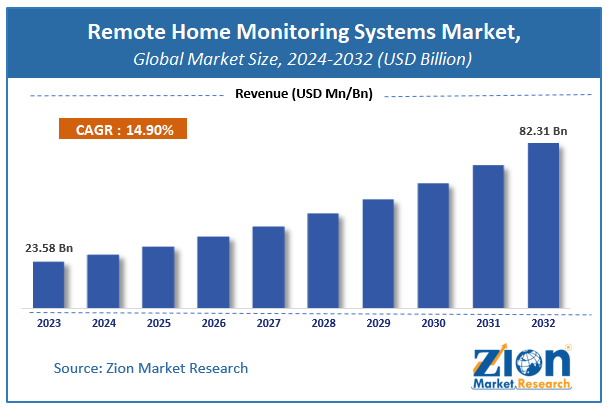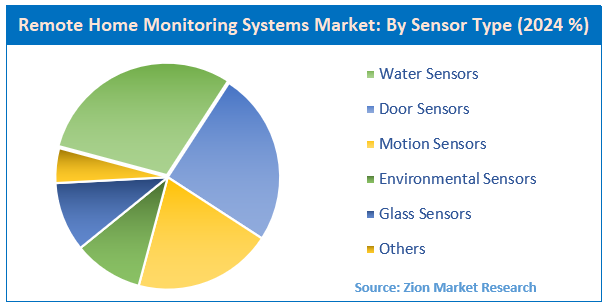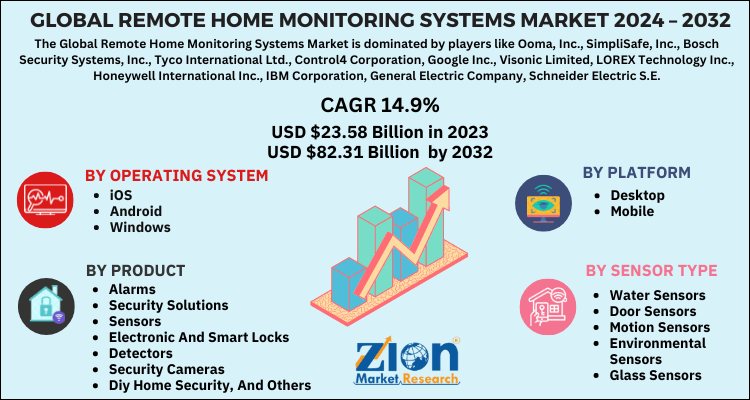Remote Home Monitoring Systems Market Size, Share, Trends, Growth and Forecast 2032

Remote Home Monitoring Systems Market By sensor type (water sensors, door sensors, motion sensors, environmental sensors, glass sensors, and others), By product (alarms, security solutions, sensors, electronic and smart locks, detectors, security cameras, DIY home security, and others), By platform (desktop and mobile), By operating system (iOS, Android, and Windows) And By Region: - Global And Regional Industry Overview, Market Intelligence, Comprehensive Analysis, Historical Data, And Forecasts, 2024-2032
| Market Size in 2023 | Market Forecast in 2032 | CAGR (in %) | Base Year |
|---|---|---|---|
| USD 23.58 Billion | USD 82.31 Billion | 14.9% | 2023 |
Description
Remote Home Monitoring Systems Market Insights
According to the report published by Zion Market Research, the global Remote Home Monitoring Systems Market size was valued at USD 23.58 Billion in 2023 and is predicted to reach USD 82.31 Billion by the end of 2032. The market is expected to grow with a CAGR of 14.9% during the forecast period. The report analyzes the global Remote Home Monitoring Systems Market's growth drivers, restraints, and impact on demand during the forecast period. It will also help navigate and explore the arising opportunities in the Remote Home Monitoring Systems industry.
Key Insights:
- As per the analysis shared by our research analyst, the remote home monitoring systems market is anticipated to grow at a CAGR of 14.9% during the forecast period (2024-2032).
- The global remote home monitoring systems market was estimated to be worth approximately USD 23.58 billion in 2023 and is projected to reach a value of USD 82.31 billion by 2032.
- The growth of the remote home monitoring systems market is being driven by growing rapidly as healthcare shifts toward patient-centric, technology-driven care models.
- Based on the sensor type, the water sensors segment is growing at a high rate and is projected to dominate the market.
- On the basis of product, the alarms segment is projected to swipe the largest market share.
- In terms of platform, the desktop segment is expected to dominate the market.
- Based on the operating system, the iOS segment is expected to dominate the market.
- By region, North America is expected to dominate the global market during the forecast period.
Global Remote Home Monitoring Systems Market: Overview
In order to control the home devices such as lights, windows, utility meters, home appliances, thermostats, doors, security alarms, and other devices the remote home monitoring systems are used; this is done with the help of the in-built monitoring systems. The major reason for the implementation of the remote home monitoring system is the rapid growth in the use of the devices and smartphones coupled with the technological advancements that are endorsing the performance of the home automation products, which function with the help of the push of the button. The functioning of the remote home monitoring systems is very simple they are integrated with the mobile applications using the Android or Windows. This application sends an alert and messages to the home security and assists in lighting control, temperature control, water leakage, and others.
Global Remote Home Monitoring Systems Market: Segmentation
The market for remote home monitoring systems is globally fragmented into sensor type, product, platform, and operating system.
According to the Sensor Type, the global market is segregated into water sensors, door sensors, motion sensors, environmental sensors, glass sensors, and others.
According to the Product, the market is categorized into alarms, security solutions, sensors, electronic and smart locks, detectors, security cameras, DIY home security, and others.
According to the Platform, the market is divided into desktop and mobile.
According to the Operating System, the market is bifurcated into iOS, Android, and Windows.
Global Remote Home Monitoring Systems Market: Growth Factors
The utilization of the remote home monitoring systems has increased due to the availability of the high-speed internet and the increased adoption of the IoT technology in the smart homes. The major factors that are driving the remote home monitoring systems market are a rise in the trend for residences that are safe, convenient, energy efficient, and luxurious and the increase in the expenditures for the lifestyle products are affecting the market positively. The integration of the home automation system with the devices is a complex procedure and its installation also has technical issues thus introducing challenges for the remote home monitoring systems market.
Recent Developments
- In February 2021, Philips finalized its acquisition of BioTelemetry, a move that significantly bolstered its remote cardiac diagnostics and monitoring services.
- In April 2022, Philips advanced the integration of its Capsule and BioTelemetry assets to solidify its connected care platform.
- In February 2023, Amazon completed its acquisition of One Medical, dramatically expanding its footprint in the primary and virtual care sectors.
- In June 2024, ResMed acquired the UK-based remote monitoring platform Inhealthcare to broaden its capabilities in virtual ward services and wider remote patient monitoring.
Remote Home Monitoring Systems Market: Report Scope
| Report Attributes | Report Details |
|---|---|
| Report Name | Remote Home Monitoring Systems Market |
| Market Size in 2023 | USD 23.58 Billion |
| Market Forecast in 2032 | USD 82.31 Billion |
| Growth Rate | CAGR of 14.9% |
| Number of Pages | 193 |
| Key Companies Covered | Ooma, Inc., SimpliSafe, Inc., Bosch Security Systems, Inc., Tyco International Ltd., Control4 Corporation, Google Inc., Visonic Limited, LOREX Technology Inc., Honeywell International Inc., IBM Corporation, General Electric Company, Schneider Electric S.E., Nortek Security & Control, LLC., Apple Inc., Samsung Electronics Co. Ltd., and Siemens Corporation |
| Segments Covered | By sensor type, By product, By platform, By operating system and By Region |
| Regions Covered | North America, Europe, Asia Pacific (APAC), Latin America, Middle East, and Africa (MEA) |
| Base Year | 2023 |
| Historical Year | 2018 to 2022 |
| Forecast Year | 2024 - 2032 |
| Customization Scope | Avail customized purchase options to meet your exact research needs. Request For Customization |
Remote Home Monitoring Systems Market Dynamics:
Key growth drivers
The Remote Home Monitoring Systems market is being driven by a convergence of factors. The growing elderly population globally and the increasing prevalence of chronic diseases like diabetes and heart conditions are creating a strong demand for continuous, in-home health monitoring. This shift is also supported by the desire for more cost-effective healthcare solutions, as remote monitoring can reduce hospital readmissions and the need for frequent in-person doctor visits. Furthermore, the rapid advancements in technology, including the proliferation of smart home devices, IoT sensors, and the integration of AI, are making these systems more accurate, user-friendly, and accessible to a wider consumer base.
Restraints
Despite the market's potential, several key restraints hinder widespread adoption. A major concern for both consumers and healthcare providers is data privacy and security. The sensitive nature of health and personal data collected by these systems makes them a prime target for cyberattacks, leading to a significant lack of trust. The high initial cost of these systems, including the hardware, software, and installation, can be a barrier for many individuals and small clinics. Additionally, the lack of standardized regulatory and reimbursement policies across different regions and insurance providers creates uncertainty for both vendors and end-users, complicating market entry and scaling.
Opportunities
The Remote Home Monitoring Systems market presents significant opportunities for innovation and expansion. The integration of advanced technologies like Artificial Intelligence (AI) and Machine Learning (ML) offers a chance to move beyond simple data collection to predictive analytics, enabling the early detection of health issues and personalized care plans. There is a vast opportunity to expand into new applications beyond health, such as home security, environmental monitoring, and assisted living for people with disabilities. The growing trend of "hospital-at-home" and telehealth services, accelerated by recent global events, has created a fertile ground for these systems to become a core component of modern healthcare delivery, bridging the gap between clinical settings and the home.
Challenges
The market is also confronted with several challenges that must be addressed for sustained growth. Ensuring the accuracy and reliability of the data collected by various sensors and devices is a critical technical challenge, as a faulty reading could have serious health consequences. The lack of interoperability between different devices and platforms can make it difficult to create a unified and seamless monitoring ecosystem. Moreover, the user experience can be a challenge, particularly for elderly users or those with limited technical literacy, requiring intuitive interfaces and robust customer support. Finally, overcoming the resistance from traditional healthcare professionals who may be skeptical of using data from home monitoring systems in clinical decision-making remains a significant hurdle.
Global Remote Home Monitoring Systems Market: Regional Analysis
The geographical diversification of the market for the remote home monitoring systems is given by North America, Latin America, the Middle East & Africa, Western Europe, Eastern Europe, and Asia Pacific. The developments that are made in the technology and the growth in the adoption of home automation products are some of the factors that contributed to the dominance of the North America. The second place is held by Asia Pacific region which is followed by Western Europe and the Middle East and Africa regions.
Global Remote Home Monitoring Systems Market: Competitive Players
The key market players that are involved in the remote home monitoring systems market include:
- Ooma, Inc.
- SimpliSafe, Inc.
- Bosch Security Systems, Inc.
- Tyco International Ltd.
- Control4 Corporation
- Google Inc.
- Visonic Limited
- LOREX Technology Inc.
- Honeywell International Inc.
- IBM Corporation
- General Electric Company
- Schneider Electric S.E.
- Nortek Security & Control, LLC.
- Apple Inc.
- Samsung Electronics Co. Ltd.
- Siemens Corporation.
The Global Remote Home Monitoring Systems Market is segmented as follows:
By Sensor Type
- Water Sensors
- Door Sensors
- Motion Sensors
- Environmental Sensors
- Glass Sensors
- Others
By Product
- Alarms
- Security solutions
- Sensors
- Electronic and smart locks
- Detectors
- Security cameras
- DIY home security, and others
By Platform
- Desktop
- Mobile
By Operating System
- iOS
- Android
- Windows
Global Remote Home Monitoring Systems Market: Regional Segment Analysis
- North America
- U.S.
- Europe
- UK
- France
- Germany
- Asia Pacific
- China
- Japan
- India
- Latin America
- Brazil
- The Middle East and Africa
What Reports Provides
- Full in-depth analysis of the parent market
- Important changes in market dynamics
- Segmentation details of the market
- Former, on-going, and projected market analysis in terms of volume and value
- Assessment of niche industry developments
- Market share analysis
- Key strategies of major players
- Emerging segments and regional markets
- Testimonials to companies in order to fortify their foothold in the market.
Table Of Content
FrequentlyAsked Questions
Based on statistics from the Zion Market Research, the global Remote Home Monitoring Systems Market size was projected at approximately US$ 23.58 Billion in 2023. Projections indicate that the market is expected to reach around US$ 82.31 Billion in revenue by 2032.
The global Remote Home Monitoring Systems Market is expected to grow at a Compound Annual Growth Rate (CAGR) of around 14.9% during the forecast period from 2024 to 2032.
North America is expected to dominate the global Remote Home Monitoring Systems Market.
The global Remote Home Monitoring Systems Market is driven by several key factors such as; rising demand for fresh and organic produce, population growth, and health-conscious consumer preferences.
Some of the prominent players operating in the global Remote Home Monitoring Systems Market are; Ooma, Inc., SimpliSafe, Inc., Bosch Security Systems, Inc., Tyco International Ltd., Control4 Corporation, Google Inc., Visonic Limited, LOREX Technology Inc., Honeywell International Inc., IBM Corporation, General Electric Company, Schneider Electric S.E., Nortek Security & Control, LLC., Apple Inc., Samsung Electronics Co. Ltd., and Siemens Corporation
The global Remote Home Monitoring Systems Market report provides a comprehensive analysis of market definitions, growth factors, opportunities, challenges, geographic trends, and competitive dynamics.
HappyClients
Zion Market Research
Tel: +1 (302) 444-0166
USA/Canada Toll Free No.+1 (855) 465-4651
3rd Floor,
Mrunal Paradise, Opp Maharaja Hotel,
Pimple Gurav, Pune 411061,
Maharashtra, India
Phone No +91 7768 006 007, +91 7768 006 008
US OFFICE NO +1 (302) 444-0166
US/CAN TOLL FREE +1 (855) 465-4651
Email: sales@zionmarketresearch.com
We have secured system to process your transaction.
Our support available to help you 24 hours a day, five days a week.
Monday - Friday: 9AM - 6PM
Saturday - Sunday: Closed







